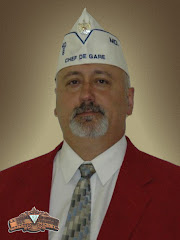By Donna Miles American Forces Press Service
WASHINGTON, Nov. 10, 2005 – A unique center here is helping troubled veterans turn their lives around by providing a military-style program designed to help them beat addictions, develop career skills, land jobs, find homes, and become productive citizens.
The Maryland Center for Veterans Education and Training, MCVET for short, offers an ambitious array of programs aimed at getting veterans back on their feet and into the mainstream sober, drug-free and self-sufficient. Military service provides the common thread behind the program. All "students," as participants are called, are veterans, as well as 75 percent of the staff.
The result is a program that puts heavy emphasis on the structure its students once embraced. "In many cases, the military was the last structure in their lives," said retired Army Col. Charles Williams, the center's executive director.
Williams and the rest of the MCVET staff are convinced that a return to that structure is the best way for troubled vets to begin their recovery. So from the day they enter the program, living in open-bay-style dormitories with beds sporting hospital corners and shoes placed "dress-right-dress" beneath their bunks, students re-enter the disciplined world many said goodbye to when they left the military. And just like in the military, they advance to leadership positions in the program and enjoy perks like semiprivate rooms as they make progress.
Darvis Tabrizi, who entered the MCVET program in August 2004, said the structure was exactly what he needed to deal with the alcohol and drug addiction that got him thrown out of the Navy in 2003 and ultimately left him jobless, homeless and estranged from his family.
"I needed to be grounded and I needed to be structured, and this place gave me that," Tabrizi said.
"It provided a foundation and a structured process to guide me," agreed Ezekiel Pankey, who went through the program nine years ago and now conducts outreach to tell other veterans who might need it about the program.
But MCVET is far more than a boot camp. Students tap into a wide array of services as they confront their demons and move forward. The Department of Veterans Affairs provides medical services and psychological counseling critical in overcoming drug and alcohol addiction or post-traumatic stress disorder or other psychological difficulties. The Department of Housing and Urban Development provides housing assistance to the veterans, many of them homeless when they enter the program. The Department of Labor funds job training.
"It all comes together here," Williams said. "We are taking our students from dependence to independence."
Much of the program's emphasis is on education, with the schedule of activities revolving around classes that range from confronting addictions to developing life skills to help them cope on the "outside."
While MCVET offers all the tools needed for troubled vets to move on with their lives, the most important predictor of success comes from the students themselves.
"You have to give 100 percent and really want to be here," Tabrizi said. "This place works, but only if you want it to work."
"This is not a place to hibernate," Williams said. "It's a place to get your life together, and that takes hard work and a genuine commitment."
Just two months into the program, Crystal Showell, a 10-year member of the Coast Guard who is struggling to overcome drug and alcohol addiction, said she feels well on the way to a new start. She's attending mandatory classes that she said have taught her more about herself and her addictions in 60 days than she picked up during four years of college.
"I want to learn to live clean and sober and be strong enough when I leave here so I don't need that crutch anymore," the former petty officer said.
As they tackle these basics, students also begin focusing on what's ahead in their careers.
"We're not looking to simply get these people jobs. We want them to have a skill that provides them a career that pays a living wage, not a minimum wage," Williams said. "We don't want any of our people going to McDonald's unless they're eating or managing the place."
Getting to that point doesn't happen overnight, Williams acknowledged. Students can stay in the MCVET program for as long as five years, advancing from one phase to another as they begin the process of rebuilding their lives.
"You can't take a person who's been on drugs 10 years and rehabilitate them in 30 days," he said. "It takes time to do this."
Even after students have completed the program, gotten a job and moved into their own homes, the staff keeps in touch with them to see how they're doing and catch them if they begin backsliding.
If there's one lesson Andre Walters learned since coming to MCVET 18 months ago, it's that past mistakes don't have to become a lifetime pattern. "There's a sense of fulfillment, of satisfaction in knowing that you don't have to be a quitter and give up just because you made mistakes in the past," he said. "You can turn things around, and you do that here through teamwork and camaraderie and hard work."
A year into the program, Tabrizi is putting his life back together. He's "clean" and has re-established his relationship with his family. He's got a job at the MCVET front desk and is sharpening his computer skills as he prepares to return to school. A former Navy aviation machinist mate, Tabrizi is looking forward to studying helicopter mechanics at the University of the District of Columbia this spring and has already been promised a job at Johns Hopkins Hospital in Baltimore, maintaining helicopters for the medevac crews.
Looking back, Tabrizi said he'd never have been able to make the turnaround he's experienced without the MCVET staff and program. "I just wanted a way out, and I found it here," he said. "The staff here gave me hope and made me want to do it, and they taught me to be a better person."
Williams, who helped establish the MCVET program 11 years ago, said he's confident it's made a huge difference in the lives of the 5,000 students who've participated in the program so far.
"We don't say we've saved every one of them," he said. "But of those who stay 30 days, seven out of 10 will return to their families as productive citizens with jobs."
Jeffrey Kendrick, a retired Air Force master sergeant who's director of operations at MCVET, said the staff "gets swept up" in the gratification of helping veterans jump-start their lives.
"It's a very rewarding experience, because you see that your work actually pays off in the end," he said. "The staff is this program's greatest strength. It's not just a job. We believe in what we do here."
Rheebe Bryant, a retired soldier who's now a drug and alcohol counselor at MCVET, said the program provides a unique opportunity to serve men and women who have served their country. "The satisfaction here is helping other veterans," she said. "At the end of the day, you know that you've helped someone."
Related Sites:
Maryland Center for Veterans Education and Training





